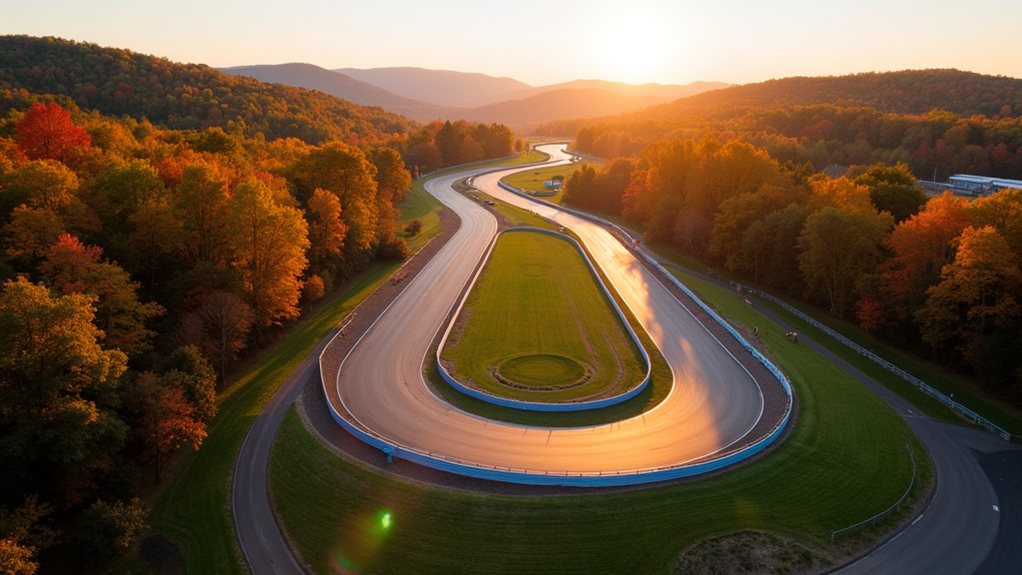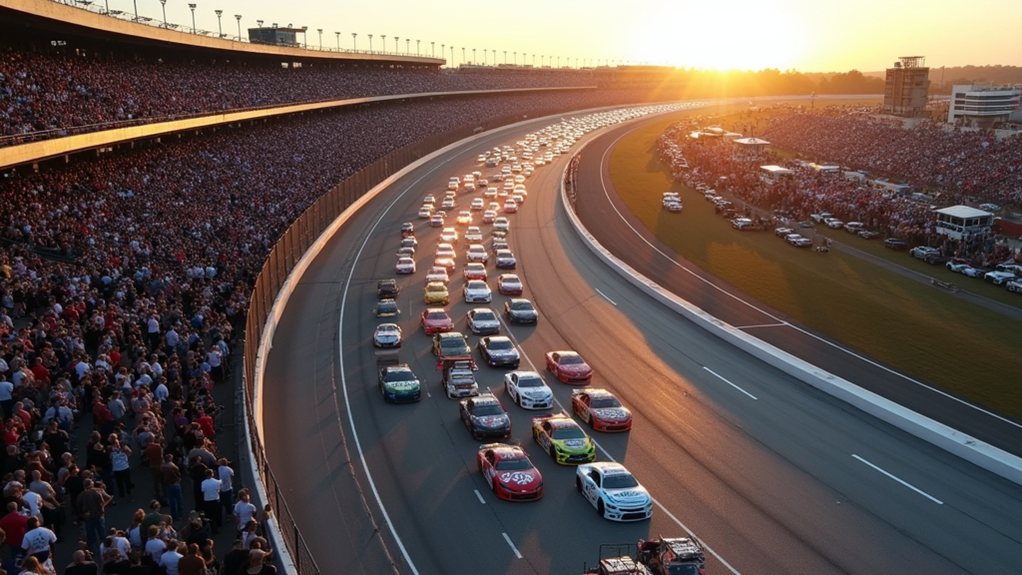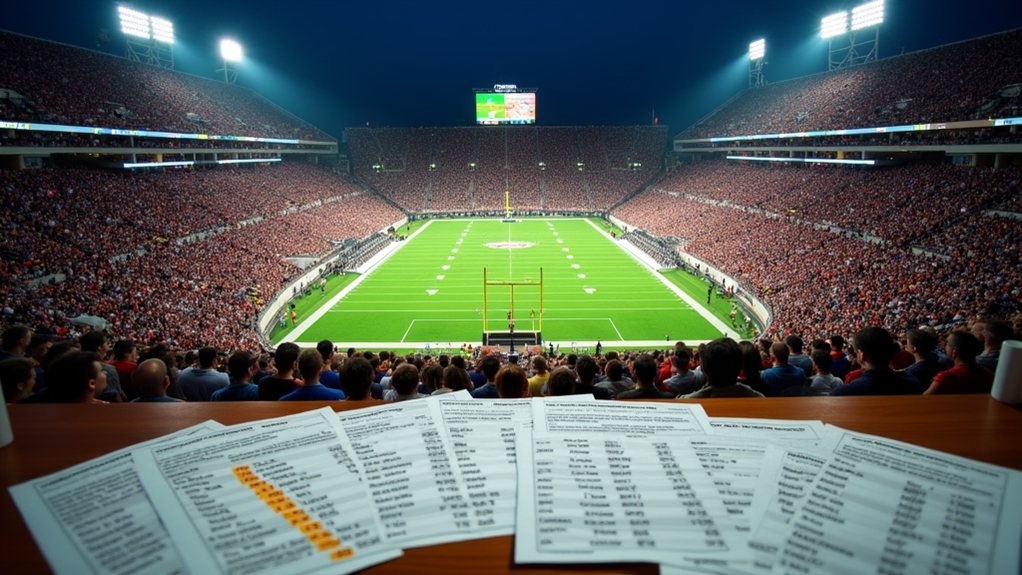NASCAR fans recognize that track selection drives betting value. The right venue can deliver thrilling lead changes, dramatic crashes, and unexpected winners. Talladega’s wide banking creates four-wide racing opportunities while Bristol’s night races showcase short-track intensity. Savvy bettors study track characteristics before placing wagers. Our experts have analyzed decades of race data across these high-profile speedways. Uncover how these iconic venues shape race outcomes and create profitable opportunities for informed bettors.
Talladega vs. Daytona: Battle of the Superspeedway Giants
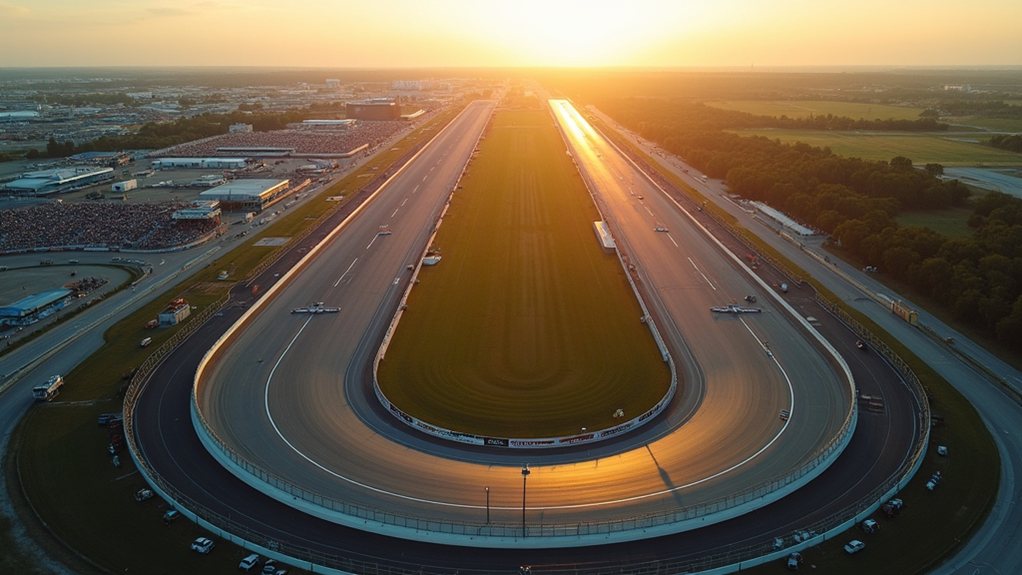
When comparing NASCAR’s legendary superspeedways, Talladega and Daytona stand as the undisputed titans of high-speed racing.
Talladega’s 2.66-mile track exceeds Daytona by .16 miles, offering steeper 33-degree banking and a wider surface for more side-by-side action.
Talladega’s mammoth layout delivers more banking, more width and more thrills than its Florida counterpart.
The racing dynamics differ considerably. Talladega prioritizes raw speed and allows for four and five-wide racing, while Daytona emphasizes handling precision. Previously named Alabama International Motor Speedway until 1989, Talladega has become synonymous with thrilling, unpredictable competition. Drivers often find Daytona more challenging during hotter conditions when the slickness of surface affects vehicle performance.
Bill Elliott’s historic 212.809 mph qualifying run at Talladega remains NASCAR’s gold standard for speed.
Both tracks deliver similar lead changes (30-50 per race) and maintain their status as restrictive plate venues, creating unpredictable outcomes that serious bettors must consider.
Bristol Motor Speedway: Where Night Racing Creates Magic
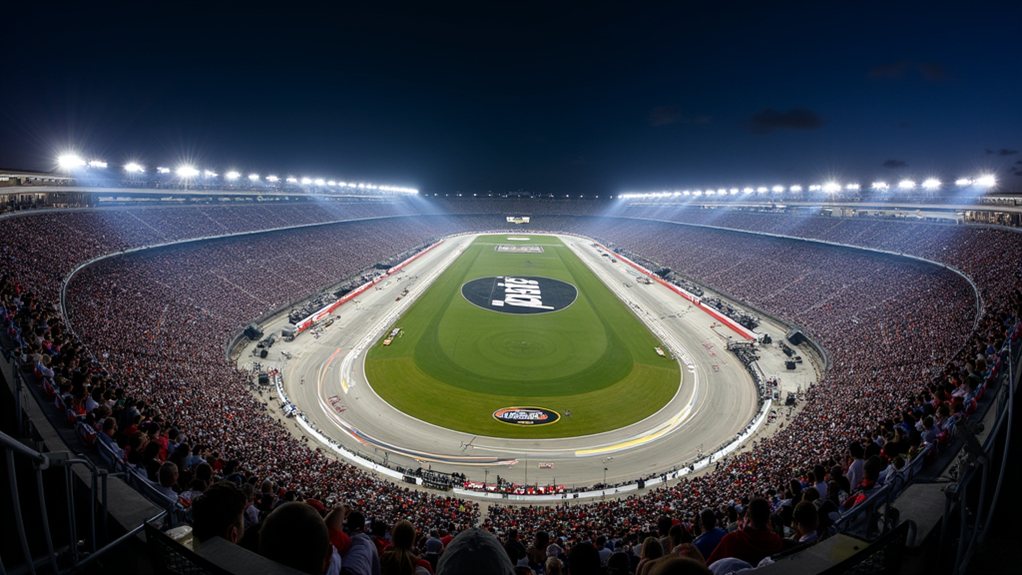
Why do NASCAR fans consider Bristol Motor Speedway the ultimate racing destination? This iconic 0.533-mile oval delivers high-intensity action with its steep 28-degree banking.
Bristol’s night racing creates an electrifying atmosphere that’s unmatched in motorsports.
With seating for 146,000 spectators, Bristol offers the gold standard in NASCAR viewing experiences. The Bass Pro Shops Night Race stands as a pivotal playoff event where champions prove their mettle under the lights. The track has remarkably maintained 20 consecutive finishes at exactly 500 laps, a testament to its consistent racing quality.
Kyle Busch dominates among active drivers, while Darrell Waltrip’s 12 victories remain the benchmark of excellence.
While the Daytona 500 may be NASCAR’s most prestigious race, Bristol offers the crown jewel experience for fans seeking intense short-track competition.
The track’s recent improvements guarantee fans experience racing’s premier showdowns at the Tennessee facility NASCAR experts call legendary.
The Brickyard Legacy: Indianapolis Motor Speedway’s NASCAR Impact
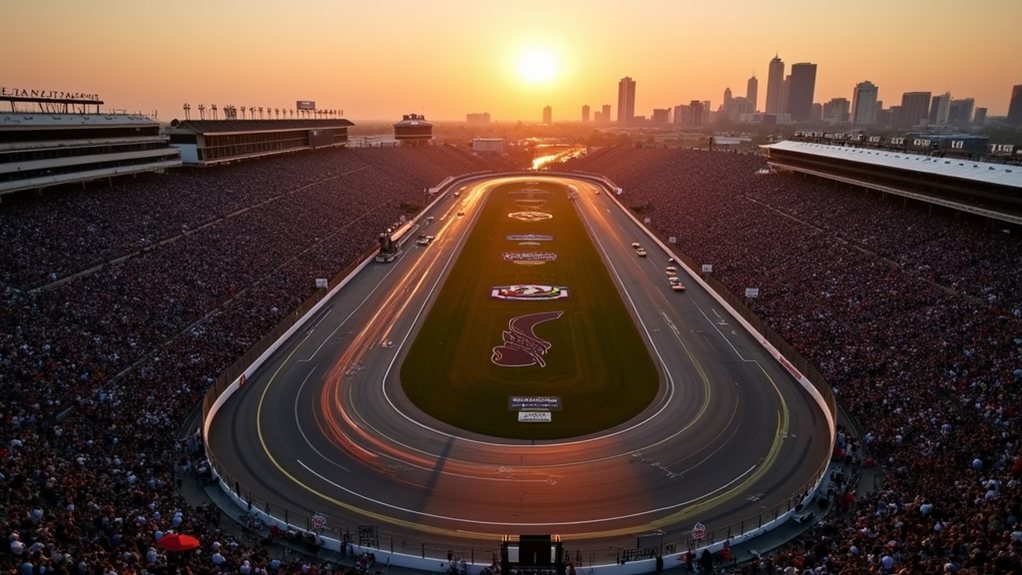
Indianapolis Motor Speedway stands as a legendary crossroads where NASCAR history and open-wheel tradition converge on hallowed ground. Since Jeff Gordon’s initial Brickyard 400 victory in 1994, this iconic 2.5-mile track has become a crown jewel in NASCAR’s gold standard racing schedule.
| Notable NASCAR Winners | Year | Significance |
|---|---|---|
| Jeff Gordon | 1994 | Initial Brickyard winner |
| Dale Earnhardt | 1995 | Legend’s only IMS win |
| Kyle Busch | 2015 | Part of championship season |
The track’s long straights and challenging corners create betting opportunities unlike any other venue. Don’t Miss Out on the action where champions are crowned and racing history is written with every lap!
Road Course Challenges: How Watkins Glen Tests Driver Versatility
While Indianapolis Motor Speedway tests drivers on its historic oval, Watkins Glen International presents a completely different challenge on the NASCAR circuit.
The 3.4-mile road course demands versatility with its 11 technical turns and dramatic elevation changes. Drivers must master both aggressive braking techniques and strategic drafting on the long straights to gain an edge.
The Glen rewards those with exceptional line selection skills and aerodynamic understanding. For playoff contenders, this track becomes even more critical.
With limited starting positions and the introduction of new tire compounds, experience at Watkins Glen can make the difference between advancing or elimination. Don’t miss this pivotal road course showdown!
FAQs
How Do High-Banking Tracks Affect NASCAR Car Setup and Driver Strategy?
High-banking tracks require specialized car setup with adjusted aerodynamics, suspension, and weight distribution. Drivers adopt strategies emphasizing higher cornering speeds, multiple racing lines, and calculated risk management through steep turns.
What Safety Improvements Have NASCAR Tracks Implemented Following Major Accidents?
NASCAR tracks have implemented SAFER barriers, improved catch fencing, augmented runoff areas, paved infield sections, and added impact-absorbing walls following incidents like Dale Earnhardt Sr.’s fatal crash in 2001.
How Do Seasonal Weather Changes Impact Race Performance at Outdoor Tracks?
NASCAR races see up to 15% performance variation across seasons. Summer heat reduces grip and engine efficiency, while spring’s cooler temperatures improve tire grip. Fall races often yield faster times due to ideal air density conditions.
Which NASCAR Track Offers the Best Viewing Experience for First-Time Attendees?
Bristol Motor Speedway offers newcomers exceptional viewing with its bowl-shaped design providing clear sightlines from every seat. The intense short-track racing and electric atmosphere create an unforgettable introduction to NASCAR.
How Has Track Repaving Affected Race Dynamics and Driver Competition?
Like a snake shedding skin, repaved tracks transform racing’s soul. Fresh asphalt reduces tire wear and eliminates character-building bumps, creating faster speeds but potentially limiting overtaking opportunities while rewarding drivers who adapt quickest.
